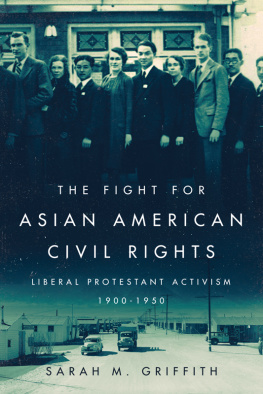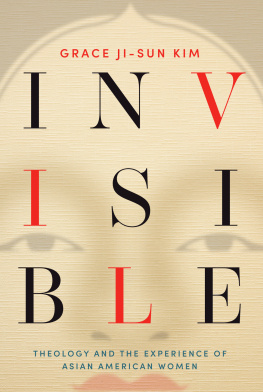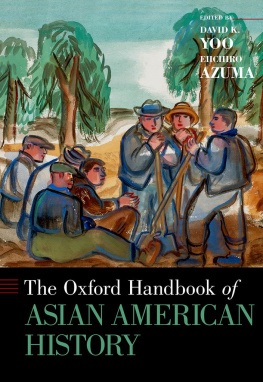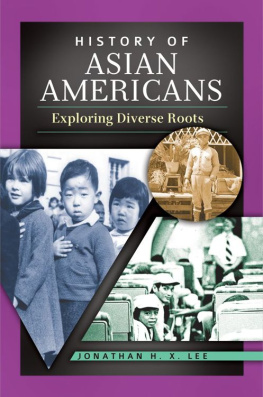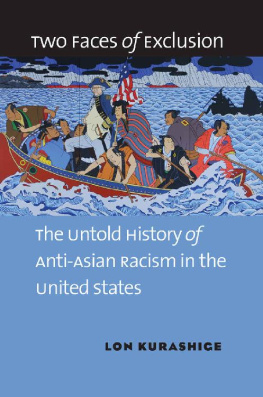Sarah M Griffith - The Fight for Asian American Civil Rights: Liberal Protestant Activism, 1900-1950
Here you can read online Sarah M Griffith - The Fight for Asian American Civil Rights: Liberal Protestant Activism, 1900-1950 full text of the book (entire story) in english for free. Download pdf and epub, get meaning, cover and reviews about this ebook. year: 2018, publisher: University of Illinois Press, genre: Politics. Description of the work, (preface) as well as reviews are available. Best literature library LitArk.com created for fans of good reading and offers a wide selection of genres:
Romance novel
Science fiction
Adventure
Detective
Science
History
Home and family
Prose
Art
Politics
Computer
Non-fiction
Religion
Business
Children
Humor
Choose a favorite category and find really read worthwhile books. Enjoy immersion in the world of imagination, feel the emotions of the characters or learn something new for yourself, make an fascinating discovery.
- Book:The Fight for Asian American Civil Rights: Liberal Protestant Activism, 1900-1950
- Author:
- Publisher:University of Illinois Press
- Genre:
- Year:2018
- Rating:5 / 5
- Favourites:Add to favourites
- Your mark:
The Fight for Asian American Civil Rights: Liberal Protestant Activism, 1900-1950: summary, description and annotation
We offer to read an annotation, description, summary or preface (depends on what the author of the book "The Fight for Asian American Civil Rights: Liberal Protestant Activism, 1900-1950" wrote himself). If you haven't found the necessary information about the book — write in the comments, we will try to find it.
From the early 1900s, liberal Protestants grafted social welfare work onto spiritual concerns on both sides of the Pacific. Their goal: to forge links between whites and Asians that countered anti-Asian discrimination in the United States. Their test: uprooting racial hatreds that, despite their efforts, led to the shameful incarceration of Japanese Americans in World War II. Sarah M. Griffith draws on the experiences of liberal Protestants, and the Young Mens Christian Association in particular, to reveal the intellectual, social, and political forces that powered this movement. Engaging a wealth of unexplored primary and secondary sources, Griffith explores how YMCA leaders and their partners in the academy and distinct Asian American communities labored to mitigate racism. The alliances early work, based in mainstream ideas of assimilation and integration, ran aground on the Japanese exclusion law of 1924. Yet their vision of Christian internationalism and interracial cooperation maintained through the World War II internment trauma. As Griffith shows, liberal Protestants emerged from that dark time with a reenergized campaign to reshape Asian-white relations in the postwar era.|
CoverTItle pageCopyrightContentsAcknowledgmentsIntroduction1. We Must Fight for the Lord and Japan: Christian Internationalism in the Pacific2. A Splendid Storehouse of Facts: Establishing the Survey of Race Relations on the Pacific Coast3. Once I Was an American: Asian North American Resistance in the Interwar Period4. A New Pacific Community: Debating Equality in the Interwar Period5. The Injustice of Internment: Expanding Coalitions in the Internment Era6. The Legacies of a MovementEpilogueNotesBibliographyIndex|
Griffith adds more white voices of opposition to the racism and nativism of the 1920s, gives more evidence of the global reach of Christian non-governmental organizations, and extends the work of David Hollinger and William Hutchison on the public presence of Protestant liberalism in the twentieth century. Journal of American History
The Fight for Asian American Civil Rights expands our understanding of civil rights by illuminating the contribution of liberal white leadership to Asian American equality.Jon Thares Davidann, author of Cultural Diplomacy in U.S.-Japanese Relations, 19191941
This illuminating study documents how liberal Protestant activists mobilized against racial discrimination and engaged in interracial coalition-building. Recommended. Choice
|
Sarah M. Griffith is an associate professor of history at Queens University of Charlotte.
Sarah M Griffith: author's other books
Who wrote The Fight for Asian American Civil Rights: Liberal Protestant Activism, 1900-1950? Find out the surname, the name of the author of the book and a list of all author's works by series.

